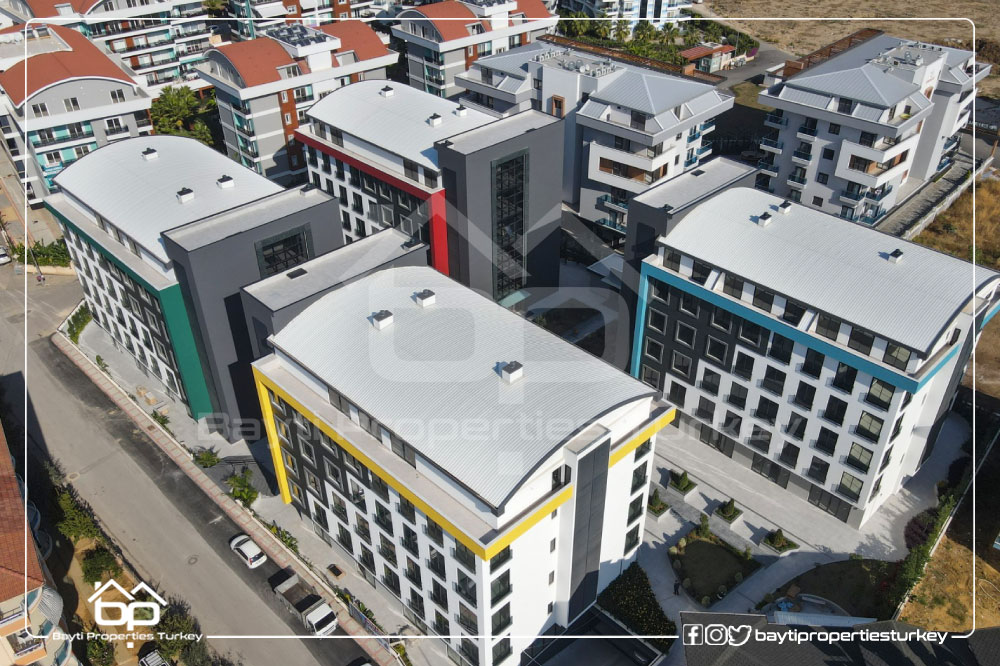Unlocking the Untold Potential: A Comprehensive Guide to Turkey’s Booming Real Estate Market
Introduction
Turkey is a truly unique country, straddling both Europe and Asia, and with a rich history that spans thousands of years. Its real estate market reflects this diversity, offering an array of investment opportunities to individuals and companies looking to capitalize on the country’s growing economy. The Turkish government has been keen to attract foreign investment, making it easier for overseas buyers to purchase property in the country.
Brief Overview of Turkey’s Real Estate Market
In recent years, Turkey’s real estate market has been experiencing steady growth, with prices rising year on year. According to data from the Turkish Statistics Institute (TurkStat), house sales across the country increased by 19.8% during the first quarter of 2021 compared to the same period in 2020. This growth has been driven by a combination of factors including favorable legislation, an increase in foreign investment, and a growing population.
One notable trend in Turkey’s real estate market is the increasing popularity of off-plan properties. These are properties that have not yet been built and are sold based on architectural plans or computer-generated images.
Many developers offer incentives such as installment payments or guaranteed rental yields to entice investors into buying off-plan properties early in their construction cycle. This trend has helped spur growth in the sector and offers an attractive option for investors looking for high returns.
Importance of Investing in Turkey’s Real Estate Market
Investing in Turkey’s real estate market offers significant potential returns for investors due to several factors including strong economic growth and favorable demographics. The country’s young population means there is significant demand for housing, particularly from younger people who are looking to buy their first homes.
Another factor driving interest in Turkey’s real estate market is its location between Europe and Asia. The country acts as a gateway between these two regions making it an attractive destination for businesses looking to establish a foothold in both markets.
Furthermore, Turkish legislation is designed to encourage foreign investment in the country’s real estate market. Non-residents can easily purchase properties and enjoy the same rights as Turkish citizens.
This makes Turkey an attractive destination for overseas investors looking to diversify their portfolios and minimize risk. Investing in Turkey’s real estate market offers significant potential returns for investors.
The country’s favorable demographics, strong economic growth, and location make it an attractive destination for businesses and individuals alike. Coupled with favorable legislation that encourages foreign investment, Turkey’s real estate market presents a unique opportunity for those looking to capitalize on the country’s growing economy.
The Turkish Real Estate Market: Overview and Key Drivers
The real estate market in Turkey has been on a steady growth path for over a decade now. Thanks to factors such as low interest rates, urbanization, and demographic changes, the demand for homes and commercial properties in the country remains strong.
The housing boom in Turkey started around 2003 following a series of economic reforms that led to an increase in domestic consumption and foreign investment. Currently, the Turkish real estate market is one of Europe’s fastest-growing markets, with Istanbul being the driving force behind this growth.
According to data from Turkey’s Statistical Institute (Turkstat), residential property prices in Istanbul increased by almost 33% between 2015 to 2020, recording the highest price increase among all regions in Turkey. Meanwhile, commercial property prices also increased by approximately 47% over the same period.
Key Factors Driving Growth
Several factors have been responsible for driving growth in Turkey’s real estate market. One such factor is urbanization.
As more people move from rural areas into cities across the country, demand for housing continues to surge. Additionally, demographic changes are also contributing significantly to growth as more young people are entering the workforce and seeking homes they can afford.
Another key driver of growth has been favorable government policies aimed at encouraging homeownership and attracting foreign investment into the country’s real estate sector. The government has introduced measures such as reduced taxes on home purchases and offering citizenship to foreigners who invest large sums into Turkish properties.
Major Players in The Industry
The Turkish real estate sector is made up of several players that include developers, investors, brokers, architects among others. Major players include Emlak Konut GYO A.S., which is owned by Turkey’s Housing Development Administration (TOKI) and works towards providing affordable housing; TURSAK Real Estate Investment Trust, which is the first and only publicly-traded REIT in Turkey; and Ağaoğlu Group, one of Turkey’s largest real estate developers. Foreign investors also play a significant role in the Turkish real estate industry.
Investors from Gulf countries such as Saudi Arabia and Kuwait are known for investing heavily in Istanbul’s luxury property market. Furthermore, Chinese investors are also starting to show interest in the country’s real estate sector due to its potential for growth and high returns on investment.
Istanbul: The Crown Jewel of Turkish Real Estate
The Overview of Istanbul’s Real Estate Market
Istanbul is the largest city in Turkey and one of the biggest metropolitan areas in the world. With a growing population and a thriving economy, Istanbul has become a prime destination for real estate investment.
The city offers a diverse range of properties that cater to many different tastes and budgets, from modern apartments to historic villas. The real estate market in Istanbul experienced significant growth in recent years, with prices increasing by an average of 18% annually.
This growth has been driven by both local demand and foreign investment, particularly from Middle Eastern countries. Despite the COVID-19 pandemic’s impact on the global economy, Istanbul’s real estate market has remained resilient.
Popular Neighborhoods and Their Unique Features
One popular neighborhood for real estate investment is Beşiktaş, located on the European side of Istanbul. This area is known for its lively atmosphere and proximity to many tourist attractions including Ortaköy Mosque and Bosphorus Bridge. Another highly popular area for investors is Şişli; it is close to some major shopping districts such as Nişantaşı and Taksim Square while also boasting excellent public transportation options.
For those looking for more traditional properties with Ottoman architecture features, Üsküdar is an attractive destination. Located on the Asian side of Istanbul along the Bosphorus Strait, Üsküdar offers stunning views of European landmarks like Topkapi Palace from across the water.
Investment Opportunities in Istanbul
Investors can take advantage of several opportunities when exploring Istanbul’s real estate market since there are several new development projects currently underway across different neighborhoods throughout this sprawling metropolis. For instance, luxury penthouses with panoramic views are being built along coastal areas like Ataşehir or Kadıköy, which are popular among high-net-worth individuals. Meanwhile, central areas like Beşiktaş and Şişli offer more affordable but still attractive investment options for those looking to invest in commercial or residential properties.
Coastal Properties: A Booming Sector
The Overview of Coastal Properties in Turkey
Turkey has a long coastline dotted with many beautiful beaches that have attracted tourists from around the world. As a result, coastal properties in Turkey have become increasingly popular among investors over the years. The country’s Mediterranean coast is home to some of the most sought-after coastal properties, especially Antalya province which has become a hub for real estate investment.
Turkey’s coastal property market offers diverse options ranging from apartments to villas, many with excellent sea views. Prices vary depending on location and amenities.
Popular Coastal Cities and Their Unique Features
Antalya is one of the most popular destinations along Turkey’s Mediterranean coast; it is known for its historic city center, stunning coastline, and modern development projects that cater to high-end clients. Alanya is another highly popular area known for its sandy beaches and rich history dating back to Roman times.
Bodrum is another top destination and is often referred to as the “St-Tropez” of Turkey due to its luxurious lifestyle offerings such as stylish restaurants and high-end shopping boutiques. Cesme located on the Aegean coast also offers warm weather year-round making it an attractive destination for those looking for vacation homes or year-round residences.
Investment Opportunities in Coastal Properties
The demand for coastal properties in Turkey continues to surge thanks largely due to an influx of foreign investors seeking high-quality beachfront real estate at affordable prices compared with more established markets like Spain or Italy. As a result, there are several investment opportunities available along Turkey’s coastline such as new developments, renovation projects, and off-plan properties.
The Role of Foreign Investors: Opportunities and Challenges
Foreign investors have played a crucial role in the growth of Turkey’s real estate market. The Turkish government has recognized the importance of foreign investment in the economy and has made efforts to create a welcoming environment for investors.
However, investing as a foreigner does come with some legal requirements. According to Turkish law, foreign buyers must obtain military clearance before purchasing any property.
This process can take up to two months and may require additional documentation. Additionally, foreigners are not permitted to purchase properties within military zones or near borders.
Despite these legal requirements, Turkey remains an attractive destination for foreign investors due to its rapidly growing economy and favorable real estate prices. The benefits of investing in Turkey’s real estate market as a foreigner are numerous.
For instance, investors benefit from lower property prices than comparable locations in Europe or North America while also enjoying investment-friendly regulations that facilitate easy acquisition processes, secure title deeds with low costs and taxes, as well as high rental yields and good return on investment. However, there are also challenges that come with investing in Turkey’s real estate market.
One such challenge is navigating the cultural differences between Turkish business practices and those of other countries. Understanding the local market dynamics is key when it comes to identifying opportunities for growth and negotiating deals successfully.
As such, it is essential for foreign investors looking to invest in Turkey’s real estate market to adopt effective strategies that will enable them to overcome these challenges. Some of these strategies may include researching local legal frameworks through an experienced lawyer’s services or engaging professional property management companies that have established relationships with local service providers.
Green Buildings
Sustainability has become increasingly important worldwide due to concerns about climate change impacts from greenhouse gas emissions generated by buildings’ operations globally. Green buildings aim at reducing energy consumption levels within their structures while optimizing natural resource use during construction processes. Turkey has been making significant efforts to promote green buildings within their real estate market.
In 2018, the country introduced the Building Assessment System for Sustainable Buildings (BREEAM). The BREEAM certification system evaluates a building’s sustainability performance based on factors such as energy consumption, water usage, and waste management.
Investing in green buildings in Turkey presents an excellent opportunity for investors to leverage sustainability trends while benefiting from government incentives aimed at promoting eco-friendly development. Additionally, sustainable buildings have the added benefit of attracting environmentally conscious tenants who are willing to pay a premium for environmentally-friendly properties.
Conclusion
Turkey’s real estate market presents several investment opportunities for local and foreign investors alike. The country’s favorable investment climate coupled with a rapidly growing economy makes it an attractive destination for investors looking to expand their portfolios. Foreign investors may face some legal requirements when investing in Turkish real estate; however, these challenges can be overcome by engaging experienced professionals and adopting effective strategies.
Furthermore, Turkey is striving towards sustainable construction practices like other countries worldwide – presenting more opportunities for growth within the green building sector. Overall, Turkey’s real estate market has immense potential and is poised to continue attracting investments in the future.












